
I love chess. Not because I'm amazing at it (I'm not, comparatively) but because to me it represents an orderly and logos centric view of life. "Life is a game of chess." These are the words that help me not take things personally and remind me that I deserve what I get out of life, and while I may not cause all of my problems, it's up to me to minimize their impact or avoid them all together.
Here is my analogy of chess:

The board:
The board is traditionally made up of white and black squares. This represents that if you are in a masculine/white/active point in your life, you are always surrounded by feminine/black/passive options. If this reminds you of the yin-yang symbol, high five!
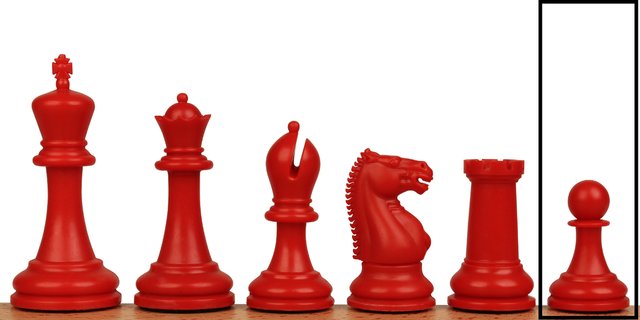
The pawns:
The pawns represent the little attitudes that we push out daily. Someone who is well balanced can actually become mostly unattackable if they keep a watchful eye over how they present themselves. The pawn moves two moves at the start (optional) because when you first present yourself, you have more freedom to make an impression as you see fit. From there on, it will be odd/inconsistent to change suddenly.
Consistency is key with pawns (how you present yourself). The only way you can attack is by staying consistent. If your pawn is in a masculine state, it can only attack by remaining in a masculine state (white square to white square). The same is true if you are using your self-image from a feminine perspective.
In general, as you progress your self-image little by little, you will keep balancing masculine and feminine with every move. It's only when you attack that you use the power of your position (masculine/feminine). However, whether attacking or simply progressing, you're always moving forward.
There is a point where you can progress your image so intensely, that you can become whatever piece you wish to be, except for another "true self" (king).
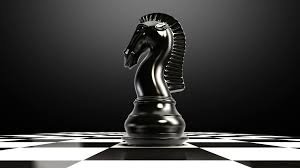
Knight:
The knight represents the pure inner-warrior. If a knight starts out passive, it will always end up aggressive and vice versa. It can't move very far, but it never moves in a straight line, always preferring to be tactical and thoughtful. Never underestimate it for it's limited range. It's known as the "Queen Killer" for a reason!
When you have a struggle in life and you begin to play out how you will resolve it, you are utilizing your inner knight.
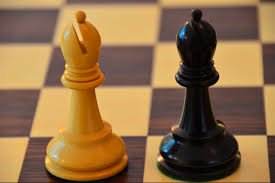
Bishop:
The bishop is your belief structure. This is why a bishop that starts on white, will always be on white and vice versa for the black bishop. Due to their steadfastness, they can never approach in a straight line, but must always move to the diagonal. While they can move as far as they want under the constraint of their beliefs, they must use other pieces to protect them from straight on logical attacks that skip over beliefs at whim (aka, the rooks), or just avoid anything that threatens them all together.
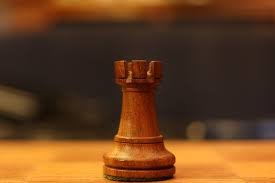
Rook:
The rook is brute force. It is a disregard to beliefs. It is the equivalent to "Hulk smash!". Just as in real life, we do not pull out our rooks until the board has developed a bit. Some people forget to even use their rooks. Others are just itching for the opportunity to pull them out so much that they make silly mistakes or sacrifices to get their rooks going.
Our culture teaches us that this brainless aggression is not ok. I disagree. There is a time and a place for the rooks where they are highly effective. The only trick is to make sure you keep account of the rest of your board and never "just use" your rooks unless it's all you have left!
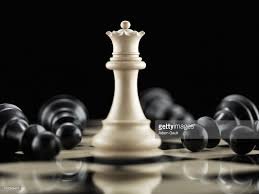
The Queen:
The queen is our impulse to fight and possibly our id. It can argue based on beliefs. It can let loose and fight like a rook. It has no reason to hold back as a knight does and will often attack to the other side of the board just because it wants to. While this is an extremely valuable tool, the queen is also instinctively protected by the rest of you. As much power as you have when you set loose your queen, the more you will sacrifice to protect it.
When you lose your queen, you lose the power of your fight. You can still win whatever the board represents to you, but losing your queen takes the sting out of your punch and gives the opportunity to whatever is opposing you.
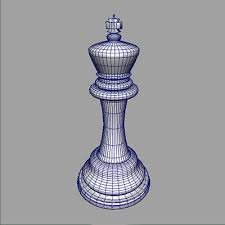
The King:
The King represents your Will in whatever the board represents. If you lose your Will to accomplish what the board represents, that board becomes irrelevant. The game is "over".
The King cannot move but one step at a time on any square available to him. However, the King represents Alpha and Omega. The board only exists because the King does. When you take your opponents' King, you have won that board and what the board represents is now conquered. The Kings' greatest power is that it exists.
Please note that the center of the line closest to the player has the purest of Will and strategy, then to the Bishops that represent beliefs, moving out to the Knights that represent being tactical, and then down to the Rooks which represents letting go and being purely aggressive or protective.
Thinking of these pieces like I do helps put your struggles into perspective. It's ok to lose a belief (bishop). It's ok to go full ham on someone (rook). The truth is, it isn't about the little losses and sacrifices. It's about winning the game.
PS, this is my take on what the chess pieces mean to my psyche. Do you have an idea of what they mean to YOU? Comment your ideas below as I would love to read them!
Myself, I like chess, but it has become formulaic for me. I watched an interesting show on "The Art of War" that looked at chess and the chinese game "Go" it made me want to check the latter game out and altered my strategy in Chess.
Downvoting a post can decrease pending rewards and make it less visible. Common reasons:
Submit
Bro, really interesting take on chess and life in general. I think you nailed the major aspects of humanity in a really clear way.
Downvoting a post can decrease pending rewards and make it less visible. Common reasons:
Submit
I appreciate that! This was pretty much my goal. Thanks!
Downvoting a post can decrease pending rewards and make it less visible. Common reasons:
Submit
I don't have a separate opinion about your own understanding of the roles of the chess pieces. But I definitely agree on what you have said on each piece. Reading your article makes me understand what is more than the moves they can make on the board, and in my opinion you have successfully interpreted it.
Downvoting a post can decrease pending rewards and make it less visible. Common reasons:
Submit
My first response understands what I was trying to get at. This makes me happy :)
Downvoting a post can decrease pending rewards and make it less visible. Common reasons:
Submit
This is a brilliant description.
Resteemed.
(I think I read a similar description elsewhere by Timothy Leary or Robert Anton Wilson... I do not recall the book though.)
Downvoting a post can decrease pending rewards and make it less visible. Common reasons:
Submit
if you figure out who it was, please let me know. i'd love to read either of their takes on it
Downvoting a post can decrease pending rewards and make it less visible. Common reasons:
Submit
I even put this in the posts worth checking out section of my #tarottuesday post of this week:
https://steemit.com/divination/@zero-infinity/tarot-tuesday-june-5-2018-edition
Downvoting a post can decrease pending rewards and make it less visible. Common reasons:
Submit
Awesome! When I wrote the article it made sense to me as a divination tool too :)
Posted using Partiko Android
Downvoting a post can decrease pending rewards and make it less visible. Common reasons:
Submit
interesting analogy to how this simple game works in relations to real life experiences. hopefully when next i'm playing the game i would be more conscious of what they represent and be more careful as to how to use them both in attacking and in defending my self. thanks for sharing, i enjoyed reading your post
Downvoting a post can decrease pending rewards and make it less visible. Common reasons:
Submit
I like the way of thinking expressed in your post. How people react and how they formulate their move (actions) can very well be dissected in a board. And everyone has their particular board shaped from their own personalities.
Downvoting a post can decrease pending rewards and make it less visible. Common reasons:
Submit
Wow this is a well detailed post and it is true that chess is life cause it opens your mind to various variations on how things can be done. Am also proud to be a chess player and I would like to play some games with you, if you are interested, follow me on lichess or drop your lichess username so that I can send a challenge. Kindly click here to review my post on the Power of love in chess
Downvoting a post can decrease pending rewards and make it less visible. Common reasons:
Submit
I hope you play well also. There an event we have every Saturday here on steemit.. The steemblitz challenge.. we play on Lichess.org like this that I played..
Here is the link https://steemit.com/steemchess/@schamangerbert/reminder-steem-blitz-chess-tournament-saturday-09th-june-20-gmt-erinnerung-steem-blitz-schach-turnier-samstag-09-juni-22-00-uhr
Downvoting a post can decrease pending rewards and make it less visible. Common reasons:
Submit
This post has received a 23.65 % upvote from @booster thanks to: @sunshinebear.
Downvoting a post can decrease pending rewards and make it less visible. Common reasons:
Submit
Very interesting article, thanks for sharing!
So many things can be linked to the great game of chess, for example the way countries interact with each other via foreign policy and the way wars are fought.
If anyone here fancies a game of chess by the way, my username is Mikerowave on www.lichess.org
Downvoting a post can decrease pending rewards and make it less visible. Common reasons:
Submit